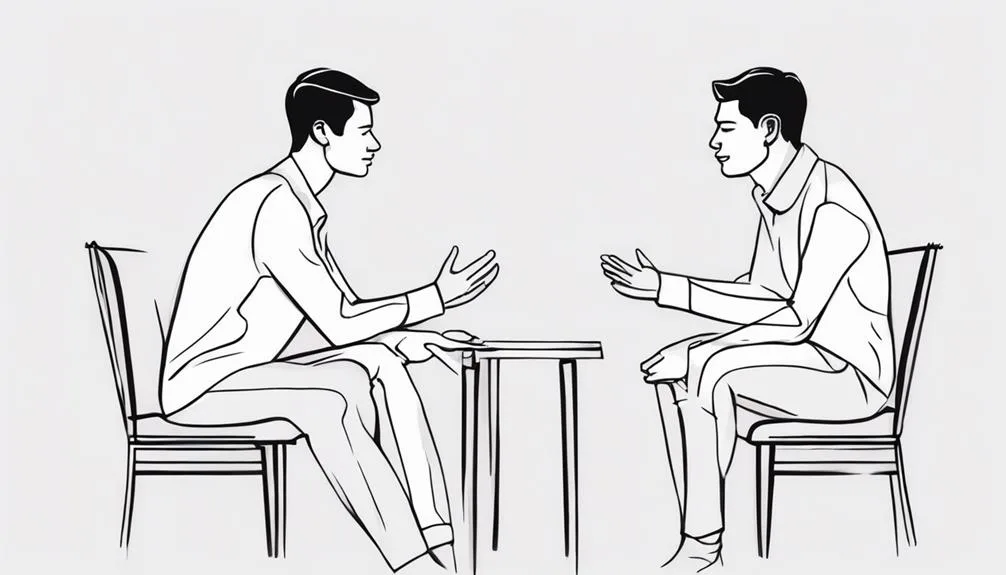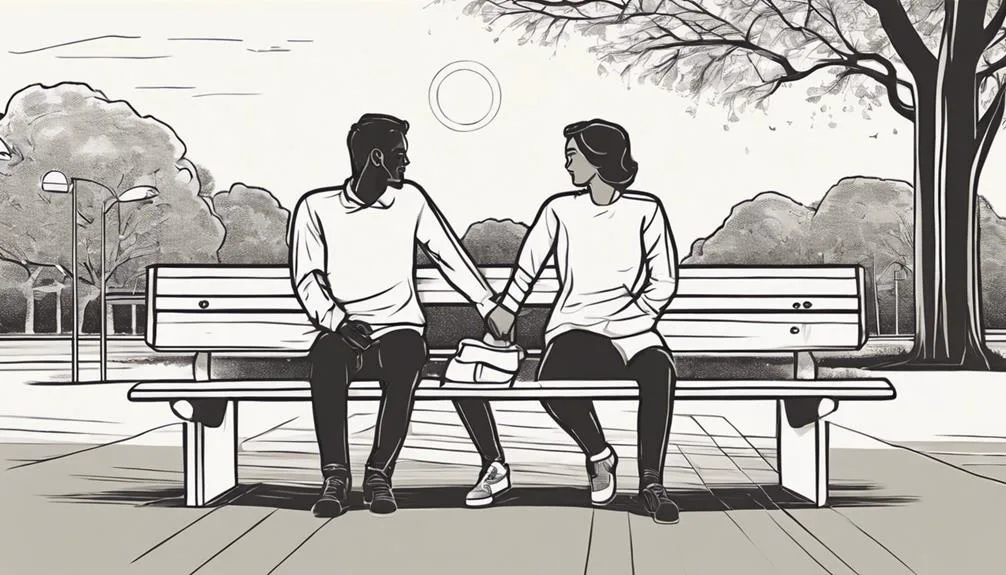When emotions flare up, it's crucial to mend your relationship post-fight. How you handle disagreements can either bring you closer or drive you apart.
By using effective strategies, you can navigate these challenges and come out with a stronger bond. Remember, every relationship faces ups and downs, but it's how you work through the tough times that truly counts.
Communicate Openly and Honestly

When addressing issues in your relationship, it's important to communicate openly and honestly with your partner. Trust building is a critical aspect of any healthy relationship. To build trust, it's essential to be transparent in your communication. Share your thoughts and feelings openly, and encourage your partner to do the same. By being honest and vulnerable with each other, you can strengthen the foundation of your relationship.
Conflict resolution is another key component of successful communication. When conflicts arise, approach them with a calm and understanding attitude. Listen actively to your partner's perspective and express your own thoughts without judgment. Work together to find a resolution that satisfies both parties. Remember, the goal isn't to 'win' the argument but to find a solution that benefits the relationship as a whole.
Take Time to Cool off
When tensions rise during a disagreement, it's important to take a breather and allow emotions to settle. Give yourself and your partner the space needed to reflect on what transpired before discussing it further.
Reflect on Emotions
Taking time to cool off and reflect on your emotions is a crucial step in resolving conflicts within a relationship. Emotional awareness and self-reflection are key components in understanding your feelings before addressing the issue with your partner.
By taking a moment to breathe and collect your thoughts, you can approach the situation with more clarity and mindfulness. Acknowledging your emotions and considering why you feel a certain way is important. This self-awareness can lead to more constructive and empathetic communication with your partner.
Developing emotional intelligence through reflective practices can help you navigate disagreements more effectively and strengthen the bond you share. Remember, it's okay to take a break to process your feelings before engaging in a conversation.
Communicate With Respect
After giving yourself space to cool off and reflect on your emotions, the next step is to communicate with respect, especially if tensions are still high. Respectful communication is key in resolving conflicts and maintaining healthy relationships.
When addressing your partner, choose your words carefully, focusing on expressing your feelings without blame or hostility. Listen actively to their perspective, showing understanding and empathy.
Setting healthy boundaries is vital during this process to make sure that both parties feel safe and respected. Remember, it's okay to take breaks during the conversation if things get too heated.
Apologize and Take Responsibility

Assuming responsibility and offering a sincere apology can be the first step towards healing and rebuilding trust after a disagreement. When you accept fault and apologize genuinely, you show your partner that you value the relationship more than your ego. Here are three key things to keep in mind when apologizing and taking responsibility:
- Be Genuine: Your apology should come from the heart. Avoid saying sorry just to end the argument. Instead, acknowledge the hurt you caused and express remorse sincerely.
- Take Ownership: Admitting your mistakes shows maturity and respect. Avoid shifting blame or making excuses. By taking ownership of your actions, you demonstrate a commitment to making amends.
- Offer to Make Amends: Words alone may not be enough. Consider how you can make it up to your partner. Whether through a kind gesture, a change in behavior, or seeking counseling together, show that you're willing to put in the effort to rebuild trust.
Listen Actively and Empathize
When conflicts arise, it's important to actively listen to your partner's feelings and thoughts without interruptions. Understanding their perspective can help you see things from their point of view and find common ground.
Show empathy in your communication by validating their emotions and making them feel heard and understood.
Active Listening Importance
To truly understand your partner's perspective and strengthen your relationship, it's important to actively listen and empathize during conversations, especially after a fight. Here are three key reasons why active listening is essential for relationship healing:
- Validation: By actively listening, you show your partner that their feelings and opinions are valid, which fosters a sense of understanding and connection.
- Building Trust: Listening attentively demonstrates that you value your partner's thoughts and emotions, helping to rebuild trust that may have been shaken during a disagreement.
- Conflict Resolution: Through active listening and empathy practice, you can uncover underlying issues, paving the way for constructive discussions and effective resolution of conflicts.
Understanding Partner's Perspective
Understanding your partner's perspective requires active listening and empathizing with their feelings and thoughts. To practice empathy effectively, try to shift your perspective and see the situation from their point of view. This can help you better understand their emotions and thoughts, fostering a deeper connection and resolving conflicts more effectively.
| Benefits of Understanding Partner's Perspective | |
|---|---|
| Builds trust | Enhances communication |
| Strengthens bond | Promotes mutual respect |
Showing Empathy in Communication
Using words that show understanding and compassion during communication can greatly enhance your connection with your partner after a fight. When practicing empathy in your conversations, remember these key points:
- Listen with your heart: Truly hear what your partner is saying without thinking about your response. Show that you care about their feelings by giving them your full attention.
- Acknowledge their emotions: Validate your partner's feelings by expressing understanding. Phrases like 'I can see why you feel that way' can go a long way in showing empathy.
- Use 'we' instead of 'you': Shift the focus from blaming statements to inclusive language. This small change can help foster a sense of unity and collaboration in resolving conflicts.
Find a Constructive Resolution
Getting through conflicts requires open communication and a willingness to actively listen to each other's perspectives. Conflict resolution is a vital aspect of relationship growth. When working towards a constructive resolution after a fight, it's important to approach the situation with a calm and understanding mindset. Begin by acknowledging each other's feelings and viewpoints without judgment. Take turns expressing your thoughts and emotions, ensuring that both parties have the chance to speak and be heard.
Focus on the specific issues at hand and avoid bringing up past grievances that may escalate the current disagreement. Look for common ground and areas of compromise where both of you can meet halfway. Remember, the goal isn't to win the argument but to find a solution that benefits the relationship as a whole.
Practice active listening by paraphrasing what your partner has said to show that you understand their perspective. Validate their feelings even if you don't agree with their point of view entirely. Be willing to apologize for any mistakes you may have made and show genuine empathy towards your partner's emotions. By working together to find a constructive resolution, you can strengthen your bond and move forward positively.
Reconnect and Show Appreciation

To strengthen your bond after a fight, take the time to reconnect with your partner and show appreciation for their efforts and presence in your life. Remember, expressing gratitude and understanding each other's love languages can go a long way in rebuilding your connection.
Here are three practical ways to help you on this journey:
- Gratitude Practice: Start a gratitude journal together. Take turns writing down things you appreciate about each other daily. This simple practice can help you both focus on the positives and foster a sense of appreciation.
- Understanding Love Languages: Explore each other's love languages. Whether it's words of affirmation, acts of service, receiving gifts, quality time, or physical touch, understanding how your partner feels loved can deepen your emotional connection.
- Small Gestures: Show your appreciation through small gestures like leaving a thoughtful note, cooking a meal, or simply spending quality time together. These acts of kindness can speak volumes and show your partner that you value them.
Conclusion
By embracing open communication, active listening, and mutual appreciation, you can navigate conflicts with a deeper bond and understanding.
Remember, love and communication are the pillars of a strong relationship.
Keep nurturing these foundations to grow together and overcome challenges as a team.

